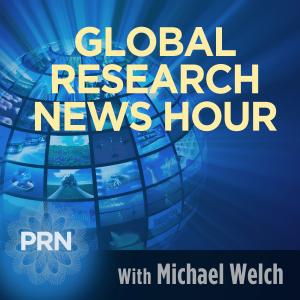Episodes

Monday Mar 21, 2016
Monday Mar 21, 2016
Politics has been called a rigged game, with elites using money and organizational resources to pull the puppet strings of most candidates for high office. However, the entrance into the race for US president of candidates Bernie Sanders and Donald Trump who both reject funding from Wall Street threatens to challenge that truism.
This week’s Global Research News Hour attempts to cut through the propaganda and jargon and assess what real options are out there for making substantive and humane political change.
William Blum is a long-time critic of US foreign policy. He has authored five books including his most recent, America’s Deadliest Export: Democracy – The Truth About US Foreign Policy and Everything Else. He also publishes the “Anti-Empire Report” on his site www dot williamblum dot org. In this interview, Blum outlines his reservations about Hillary Clinton and Bernie Sanders, the problematic media coverage of the campaign, and the astonishing view that Trump may actually be the less objectionable in certain respects than both Sanders and Clinton.
Mark Robinowitz is publisher of oilempire dot us, a political map to connect the dots. He has been a writer, political activist, ecological campaigner and permaculture practitioner for over three decades. He is also author of the forthcoming Peak Choice: cooperation or collapse, an uncensored guide to Earth, energy and money. In this interview, Robinowitz equates the choice between the Democrats and the Republicans to one between death by lethal injection and death by the electric chair. He outlines the mechanisms employed to stop any threat to the establishment from ever becoming elected president. He also explains how the energy and economic decline is becoming reflected in the politics of the Trump campaign.

Monday Mar 14, 2016
Monday Mar 14, 2016
The first interview is with Linda Pentz Gunter, international specialist for the environmental advocacy group ‘Beyond Nuclear.’ In this conversation, Gunter addresses the question of whether nuclear is being seriously explored as an alternative to the climate-ravaging fossil fuel industry. She also outlines aspects of the Fukushima cover-up, and why international bodies and media are failing to hold nuclear and government agencies to account.
In the final half hour, Portland-based Mimi German, Earth activist and founder of Radcast.org, speaks more about the cover-up, the nuclear situation in the U.S. and the consequences for society and all life on earth.

Monday Mar 07, 2016
Monday Mar 07, 2016
On this week's Global Research News Hour, on the occasion of the March 3, 2016 meeting of Canadian federal and provincial leaders in Vancouver on to work out an agreement on a national climate change plan, we explore the implications of proposed climate solutions for the future of Canada's nuclear industry, environment and energy security. We'll be joined by anti-nuclear activist Candyce Paul of the Committee for Future Generations, and by political economist, professor and author Gordon Laxer.

Monday Jul 13, 2015
Global Research News Hour - 07.13.15
Monday Jul 13, 2015
Monday Jul 13, 2015
Dissecting Operation Inherent Resolve: Conversations with Lawrence Wilkerson and Mahdi Nazemroaya
This Repeat broadcast of the Global Research News Hour (October 17, 2014) Global Research News Hour centres on the current military mobilization against the entity known as ISIL/ISIS. Can boots on the ground be avoided? Is there an ulterior motive to the bombing campaign related to regional control? What does ISIL/ISIS's successful campaign for control of the Kurdish village of Kobani say about the sincerity of this latest War on Terrorism? This hour attempts to address these and other questions.

Monday Jul 06, 2015
Global Research News Hour - 07.06.15
Monday Jul 06, 2015
Monday Jul 06, 2015
REPEAT - Greece: From Austerity to Prosperity? Conversations with Ellen Brown and Binoy Kampmark
Ellen Brown of the Public Banking Institute explains the role of Goldman Sachs in setting up Greece for a fall, and how the Mediterranean country could survive the end of the bail-outs.
In the second half hour, scholar, RMIT University lecturer and Counterpunch contributing editor Binoy Kampmark talks about the background of Syriza, the political culture on the ground, and what the future may hold for a financially emancipated Greece as well as other European countries.

Monday Jun 29, 2015
Monday Jun 29, 2015
This week's Global Research News Hour examines two of the biggest threats to human existence on planet Earth: the elimination of human habitat due to Climate Change and the dangers of an increasingly likely World War 3 scenario evolving out of the tensions growing between US/NATO and Russia/China.
The first interview guest is Guy Mcpherson, Emeritus Professor of Natural Resources and Ecology and Evolutionary Biology from the University of Arizona, and author of the blog Nature Bats Last (guymcpherson.com) He has put together a workshop on Abrupt Climate change on the site onlyloveremains.org
The second guest is Mahdi Darius Nazemroaya, a Sociologist and a Research associate with the Centre for Research on Globalization, and an award-winning author. His book The Globalization of NATO is available for purchase at the Global Research Website. Nazemroaya lays out the geopolitical dynamics pushing the US/NATO in the direction of a nuclear confrontation with RUSSIA and China.

Monday Jun 22, 2015
Monday Jun 22, 2015
As Freedom Flotilla III is departing from an undisclosed location in the Mediterranean Sea to Gaza, this week's Global Research News Hour focuses on activists abroad coming to the assistance of that region's destitute population.
We'll speak to Richard Day, a Queen's University Professor and colleague of one of the Freedom Flotilla participants about the parallels between the plight of Palestinians in Israeli occupied territories and the plight of Indigenous peoples in Colonized Canada. We'll hear a pre-recorded commentary from Professor Lovelace. We'll hear from activist and Canadian Boat to Gaza Steering Committee member David Heap about the Flotilla itself, and we'll hear from Dr. Benjamin Thomson, a physician who has worked in Gaza and is behind an exciting initiative to power Gaza hospitals with Solar panels.

Monday Jun 15, 2015
Yemen: The Silent Slaughter - 06.15.15
Monday Jun 15, 2015
Monday Jun 15, 2015
With a major humanitarian crisis hitting the population of Yemen in the wake of the Saudi Arabia-led bombing campaign, the Global Research News Hour takes alook at the damage that has been done to civilians in the country, the roots of the conflict, the involvement of outside powers and the prospects for peace at the June 14 UN peace talks in Geneva, Switzerland.
Hisham Al-Omeisy is a Yemen information and political analyst based in Sana'a. He has through social media been relaying what he has been seeing and experiencing during the siege.
Ali Saeed is the General Secretary with the Solidarity Committee for Ethiopian Political Prisoners. He speaks briefly about the polight of refugees and migrants in particular during the conflict.
Abayomi Azikiwe is a geopolicital analyst and the editor of Pan-African Newswire. He provides the historical and geo-political context to the unfolding catastrophe.

Monday Jun 08, 2015
Monday Jun 08, 2015
The Global Research News Hour speaks to Sabah Al-Mukhtar, president of the london-based Arab Lawyers Association, and with Inder Comar, the legal representative of an Iraqi Woman suing the US government over the war crimes committed in Iraq. The two lawyers discuss the realistic prospects of former US President Bush and former UK Prome Minister actuall being brought to justice.

Monday May 18, 2015
Omar Khadr, Guantanamo, and the "War On Terrorism" - 05.18.15
Monday May 18, 2015
Monday May 18, 2015
In the wake of the recently announced release on bail of Omar Khadr, the Global Research News Hour returns to the case of the young man jailed in the notorious prison camp for nearly a decade.
In the first half hour, Khadr's lawyer Dennis Edney expertly debunks many of the talking points being put forward by critics like the Conservative government and Ezra Levant about Khadr's status as a "Confessed terrorist" and outlines the numerous ways in which the Canadian government violated Khadr's Charter rights.
In the second half hour, Michel Chossudovsky expands on the Khadr tragedy by pointing to a Seymour Hersh article exposing the protection of Al Qaeda militants in theatre and the known incarceration of civilians at Guantanamo. Chossudovsky explains how the facility serves a propaganda function that enables the so-called "War on Terrorism."

